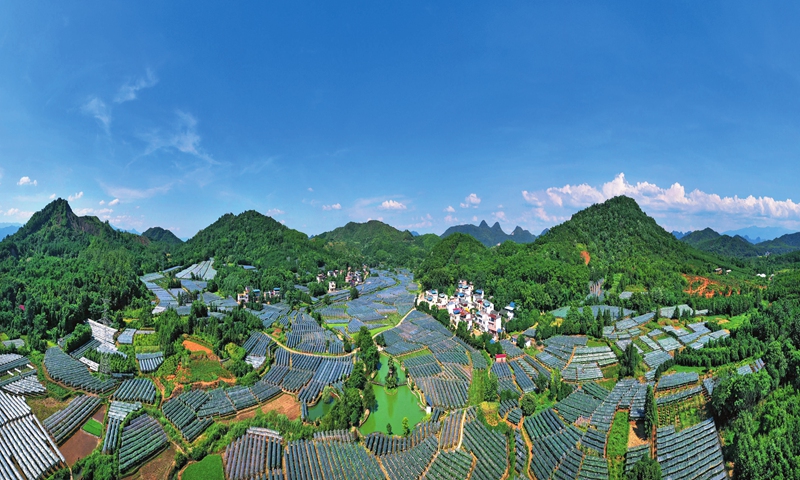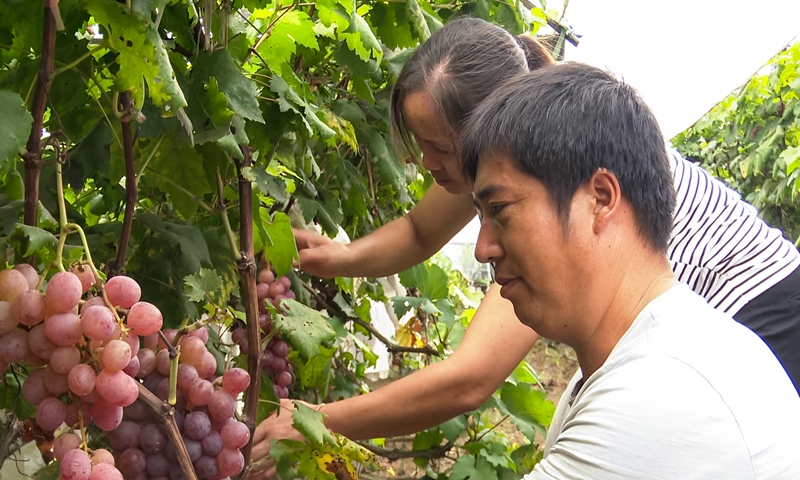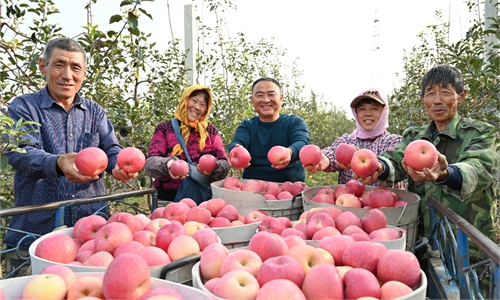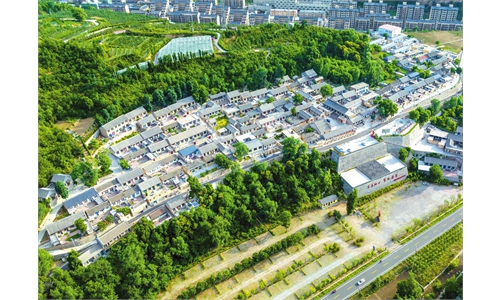SOURCE / PRESS RELEASE
Exploring China's rural transformation along Xi's footsteps - Guangxi's grape village Maozhushan

A view of Maozhushan village, South China's Guangxi Zhuang Autonomous Region Photo: Courtesy of converged media center in Quanzhou county in Guilin, South China's Guangxi Zhuang Autonomous Region
Editor's Note:
China Rural Revitalization magazine has published a series of articles on the rapid development of rural areas in China with new transformations. The articles reflect the arduous efforts of rural revitalization across China, which is an important and genuine solution to China's rural economic development. In the future, articles selected from this series will be published.

A couple check grapes in their own grape field in Maozhushan Village, South China's Guangxi Zhuang Autonomous Region. Photo: Courtesy of converged media center in Quanzhou county in Guilin, South China's Guangxi Zhuang Autonomous Region
Maozhushan village, located in Nanyi village, Caiwan town of Guilin in South China's Guangxi Zhuang Autonomous Region, is a natural village with only 46 households and 156 residents. The village, although named for the mountains and hills of moso bamboo, is known far and wide for the development of its local grape industry for over 20 years.In 2002, grapes were first grown in Maozhushan, a once-impoverished village covering an area of 60 hectares. Many young villagers who moved to big cities as migrant workers gradually returned to their home village and were employed in the grape industry.
In April 2021, when Chinese President Xi Jinping paid a formal visit to Guangxi, he stopped at Maozhushan village.
Xi, also general secretary of the Communist Party of China (CPC) Central Committee and chairman of the Central Military Commission, inspected the local grape-growing industry and called for greater efforts to pursue rural vitalization based on local specialty industries to make better use of science and technology in promoting the agricultural sector.
He also stressed measures that can ensure farmers to benefit more from the development of rural industries.
Xi walked through the village, dropping by the home of villager Wang Deli and chatting with the family.
He said that as the CPC is about to celebrate its centennial in 2021, China has scored a complete victory in its fight against poverty. However, he said promoting rural vitalization on all fronts will be no easier than the battle to fight poverty, allowing no letup or sluggishness.
Tech empowerment
"We planted a total of more than 320 mu (21.3 hectares) of grapes, with 192 mu of grape varieties improved. After the improvement, the retail price of grapes per jin (0.5 kilogram) increased by 3-5 yuan ($0.69)," said Wang Hairong, head of the local grape planting association.
In discussing new varieties and technologies used by the village's grape industry in the past few years, Wang has strong opinions.
"We also standardized the grape planting base, converting the old simple sheds into greenhouses with steel frame structure. In addition, we have promoted the application of organic cultivation, drip irrigation and water-fertilizer integration and other technologies, which has not only saved water and fertilizer, but also reduced costs," Wang noted.
Wang stressed that the village set up a 5G intelligent agricultural system - the Maozhushan grape industry digital platform. The platform not only aimed at the scientific management and care of grapes to provide timely and effective data support, but also has significantly reduced the incidence of grape pests and diseases as well as improved the quality of grapes.
"The average yield increase reached nearly 500 jin per mu," Wang said.
In addition to the "hard technology," Maozhushan village also pays special attention to the "soft power" of enhancing the scientific planting of grapes. Over recent years, the village has worked with several Guangxi agricultural research institutions to better promote the development of local grape growing.
The majority of agricultural experts and technicians not only go into the field to guide the adoption of key technologies of grape planting, but also give their opinions and suggestions from the introduction of products, equipment supply to orders for the acquisition.
Pristine water & hills
Noting the changes that have occurred to the environment of Maozhushan village, Wang Junrong, Party chief of Nanyi village, said that over the recent years, local authorities have earnestly practiced the concept of "lucid waters and lush mountains are as invaluable as silver and gold," vigorously implementing a number of infrastructure renewal projects.
In addressing the Maozhushan village environment, Wu Yecheng, an official from the Caiwan town government, was involved in the entire infrastructure upgrading and renovation projects.
According to Wu, Maozhushan village has built a cultural center, a basketball court, a theater, and completed 3.5 kilometers of road widening project as well as 2,200 square meters of parking lot construction and rainwater and sewage separation project.
In addition, the local township government carried out a comprehensive soil and water conservation management project in small watersheds, successfully transforming two weirs and one waterwheel, and comprehensively managed an area of 37.14 square kilometers to protect against soil erosion.
The projects have greatly improved the local environment, with water diversion and irrigation as well as flood discharge and flood relief capacity comprehensively upgraded, said Wu.
In addition, Maozhushan village has also completed the intelligent transformation of a high-standard power grid, providing electric power support for the wider use of drip irrigation technologies for the grape planting bases, so that the local grape industry has withstood the test of the summer and autumn drought in northern Guilin in 2022, with the grape yield increased that year.
The local government has also coordinated with the local telecom company to realize the full coverage of the mobile signal across the village, in a bid to strengthen the timely, fast and accurate communication between the village and the outside world.
In 2022, the theatrical movie My Hometown Maozhushan was filmed in the village, greatly enhancing its popularity and influence.



